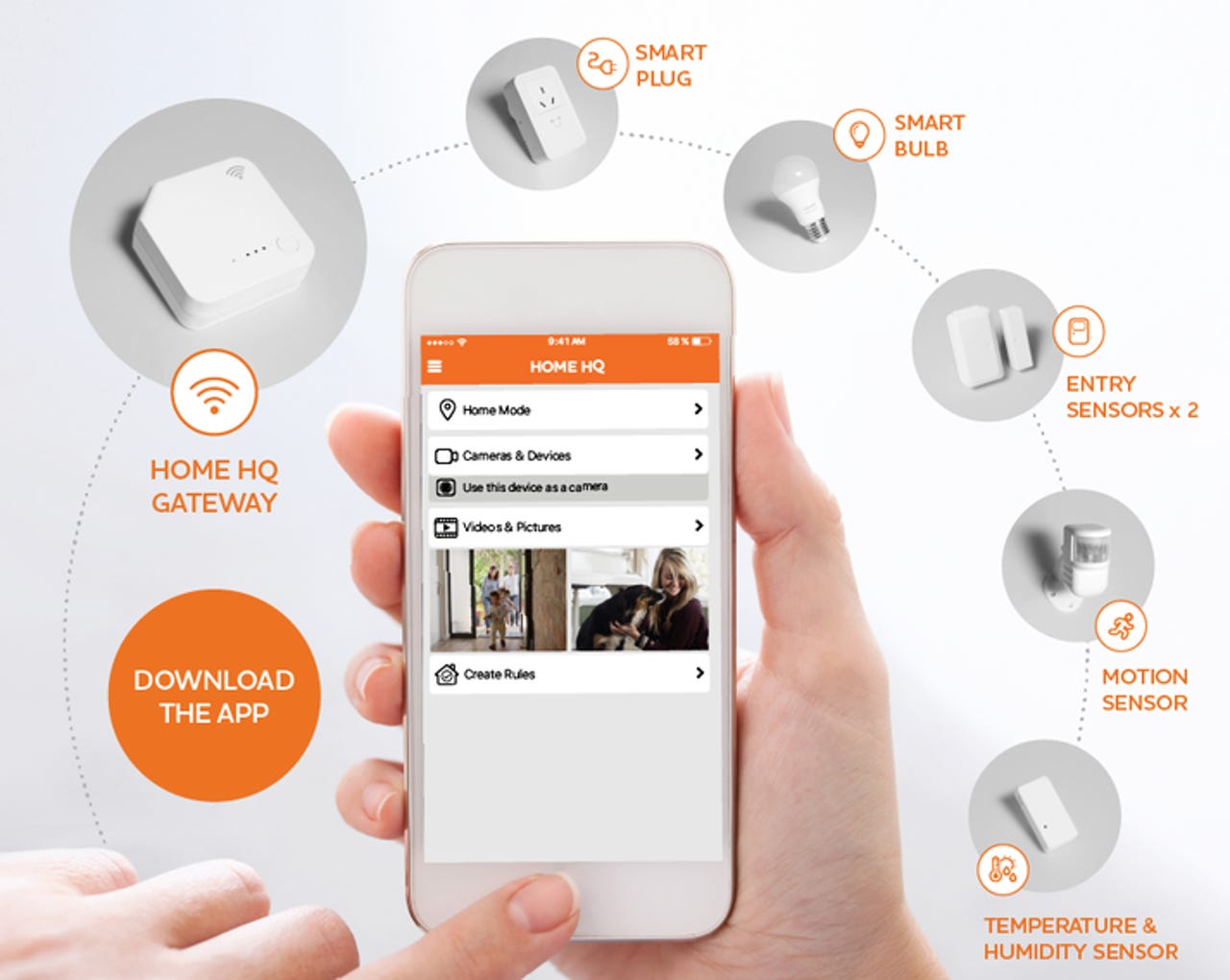Origin Energy launches smart home kit for optimising energy usage

Australian energy retailer Origin has announced launching a "sales trial" of its smart home kit, HomeHQ, aimed at assisting customers to better manage their energy usage across various home appliances.
HomeHQ, priced at AU$199, comprises sensors for detecting temperature, humidity, and motion, as well as a smart plug, smart lightbulb, and a gateway that connects to a customer's home Wi-Fi network.
Customers can use the HomeHQ mobile app to control connected devices remotely, such as by setting up rules for when the lights should automatically come on, setting up alerts for when motion is not detected for a certain period of time, or simply checking if appliances are switched on or off.
The premium version of the app, which is available on Android and iOS devices, costs AU$5 per month.
"Home HQ uses open-source technology which means that it will be able to connect many different smart devices over time," Jon Briskin, executive GM of Retail at Origin, said in a statement. "As people's smart homes grow and evolve, Home HQ will help make it simple for customers to manage all their smart devices through one application."
The smart home kit was developed in partnership with California-based startup People Power -- which Origin invested $1.2 million in back in May for exclusive marketing rights in Australia and New Zealand -- out of Origin's recently launched O hub, a new Melbourne-based workspace dedicated to prototyping, developing, and trialling new customer solutions.
HomeHQ is first available to Origin's Victorian customers, with the energy retailer saying it will announce details of product availability in other states and territories in 2018.
This is not Origin's first foray into the IoT world; in August, Origin announced trialling technology from California-based startup Bidgely that analyses data from an electricity smart meter, providing an estimated breakdown of a household's energy use into different appliance categories such as heating, cooling, lighting, refrigeration, laundry, cooking, and entertainment.
The data from the smart meter is also combined with weather data to provide personalised alerts at different points during the customer's billing cycle. Additionally, customers are able to compare energy use across billing periods, while receiving tips on how they can adjust their energy use.
Origin also announced partnering with Perth-based blockchain startup Power Ledger in September to trial an energy sharing platform that uses blockchain technology to create an immutable record of energy generation and consumption.
The trial involves using anonymised and historical customer data to explore the benefits and challenges of peer-to-peer energy trading across the network, with the companies looking to prove the accuracy and security of the Power Ledger trading platform. It will essentially investigate the viability of consumers buying and selling energy to and from their neighbours.
Fellow energy retailer EnergyAustralia launched in September an "all-in-one" solar, battery, and software solution aimed at providing consumers with greater visibility over their energy consumption.
The Redback Smart Hybrid System, developed by Brisbane-based startup Redback Technologies -- which Energy Australia invested AU$9.3 million equity investment into in October last year -- combines a solar inverter, battery enclosure, and cloud-based energy management software into a unit that can be mounted inside or outside the home.
In automatic mode, the system stores excess solar power in the battery, and when there isn't enough power available, the battery discharges, minimising draw from the grid. Redback's system is also capable of predicting household usage patterns and solar energy production using machine learning algorithms developed by Redback.
Additionally, the system, which starts at AU$9,000, can be connected with pool pumps, and, in the future, smart appliances to help reduce reliance on the grid.
Australian telcos have also entered the smart home business, with Telstra launching a swathe of Smart Home products and pricing packages, after first showcasing a smart light bulb, a window sensor, a door sensor, wide-beam motion sensors, a smart power plug, the Lockwood smart door lock, a smart thermostat, an outdoor Wi-Fi camera, an indoor Wi-Fi camera, and the Telstra Smart Home hub in June last year.
Telstra added Google Home to its smart home offerings in July this year, allowing customers to control lighting via the product's voice command at a cost of AU$124 per month.
In its own push into the smart home world, Optus in September launched the first of five "experiential" flagship stores aimed at making it simpler for customers to adopt IoT solutions in their homes.
The store showcases a kitchen, lounge room, and entryway fitted out with smart home technology including door locks, doorbells, frying pans, scales, lighting, power points, fridges, and cameras, with SoftBank's Pepper robot greeting customers as they enter the store.
The lounge room contains 16 4K TVs which feature 40 different scenarios demonstrating how to use capabilities including Optus' Fetch TV integrated with its associated app, with English Premier League and National Geographic content, and with Google Home.
Related Coverage
Origin Energy trials blockchain energy sharing initiative with Power Ledger
The trial is expected to explore the 'benefits and challenges' of customers buying and selling energy to and from their neighbours using blockchain-based technology.
Origin trialling tech to help customers track energy use across appliances
After being summoned by the government to discuss rising electricity costs, the Australian energy retailer has announced it will trial a solution that will enable households to monitor energy use across appliances.
EnergyAustralia launches system for customers to optimise energy use
Almost a year after investing in Brisbane-based startup Redback Technologies, EnergyAustralia has announced that it will be selling the startup's Smart Hybrid System.
Video: How the cloud and IoT are transforming energy delivery systems (TechRepublic)
Marc Overton of Sierra Wireless explains how end-to-end IoT solutions and real-time metering data lower delivery cost and improve consumer agency.
Why preventing IoT attacks isn't just the responsibility of security experts (TechRepublic)
Cisco's Anthony Grieco explains how enterprises need to take a deeper look at how they handle Internet of Things cybersecurity.
